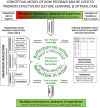Patient experience and reflective learning (PEARL): a mixed methods protocol for staff insight development in acute and intensive care medicine in the UK
- PMID: 31345985
- PMCID: PMC6661565
- DOI: 10.1136/bmjopen-2019-030679
Patient experience and reflective learning (PEARL): a mixed methods protocol for staff insight development in acute and intensive care medicine in the UK
Abstract
Introduction: Patient and staff experiences are strongly influenced by attitudes and behaviours, and provide important insights into care quality. Patient and staff feedback could be used more effectively to enhance behaviours and improve care through systematic integration with techniques for reflective learning. We aim to develop a reflective learning framework and toolkit for healthcare staff to improve patient, family and staff experience.
Methods & analysis: Local project teams including staff and patients from the acute medical units (AMUs) and intensive care units (ICUs) of three National Health Service trusts will implement two experience surveys derived from existing instruments: a continuous patient and relative survey and an annual staff survey. Survey data will be supplemented by ethnographic interviews and observations in the workplace to evaluate barriers to and facilitators of reflective learning. Using facilitated iterative co-design, local project teams will supplement survey data with their experiences of healthcare to identify events, actions, activities and interventions which promote personal insight and empathy through reflective learning. Outputs will be collated by the central project team to develop a reflective learning framework and toolkit which will be fed back to the local groups for review, refinement and piloting. The development process will be mapped to a conceptual theory of reflective learning which combines psychological and pedagogical theories of learning, alongside theories of behaviour change based on capability, opportunity and motivation influencing behaviour. The output will be a locally-adaptable workplace-based toolkit providing guidance on using reflective learning to incorporate patient and staff experience in routine clinical activities.
Ethics & dissemination: The PEARL project has received ethics approval from the London Brent Research Ethics Committee (REC Ref 16/LO/224). We propose a national cluster randomised step-wedge trial of the toolkit developed for large-scale evaluation of impact on patient outcomes.
Keywords: behaviour change; empathy; medical care; patient experience; quality improvement; reflective learning; staff experience.
© Author(s) (or their employer(s)) 2019. Re-use permitted under CC BY-NC. No commercial re-use. See rights and permissions. Published by BMJ.
Conflict of interest statement
Competing interests: None declared.
Figures



References
Publication types
MeSH terms
Grants and funding
LinkOut - more resources
Full Text Sources
Medical
